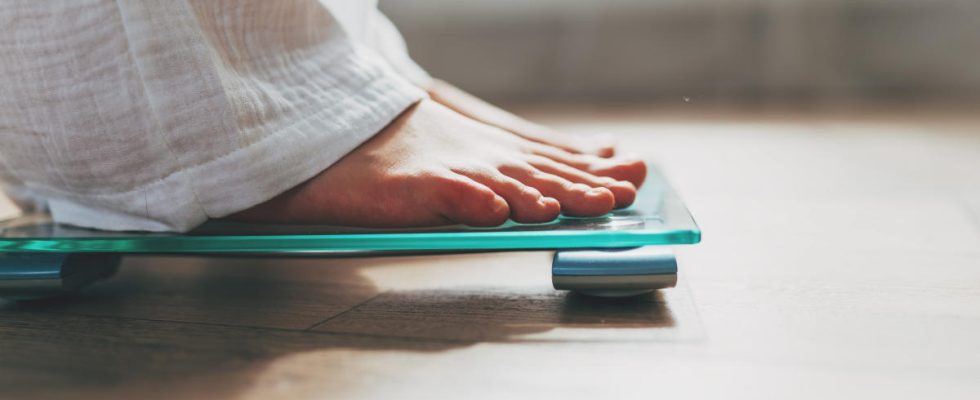Do you dread stepping on the scale? Before you panic at the thought of what numbers it might show, read this article first. The teleconsultation company Livi and the Opinéa survey institute have in fact revealed in a recent study called “The French’s relationship to weight” that 30% of French people lie to those around them about what they really weigh. More precisely, 1 in 3 French people said they had already lied about their weight.
Unsurprisingly, women (39%), more subject to beauty dictates, which promote thinness, tend to lie more than men (21%). Also 33% of French people surveyed said they were not comfortable with their weight. In detail, this concern concerns 43% of people who are overweight according to the BMI formula and 73% of people who are obese. Once again, women are the ones who are least comfortable with the numbers displayed on the scale, since 42% of them say they are not comfortable with their weight.
A French paradox
But where does this need to lie come from? “We can lie out of shame, by omission, by measurement error, or to seduce…. Shame also comes from the fact that for many, weight and silhouette are seen as parameters that can be controlled by will and motivation. If things don’t go well, we feel responsible, we feel guilty, we are ashamed”, analyzes Anne-Laure Laratte, dietician-nutritionist contacted by Yahoo.
For Arnaud Cocaul, nutritionist doctor, this shame in saying one’s weight is particularly present among French women, compared to other countries, in particular because of the very culture of France: “The two countries which put the most pressure on the weight in the world are South Korea, including for men, and France for women. France is a “schizophrenic” country, because on one side you have fashion, and on the other you have food, France is a country of gastronomy. We will tell you to eat constantly, with the food industry which is very present in advertisements and which encourages you to eat, but you also have advertisements for clothes…”
“1m60 for 50 kg in a woman, that means nothing”
Still, the French could save themselves a lot of stress and appearances around weight, because it actually doesn’t say much about a person’s health. “Two people of the same height can weigh the same but have two radically different silhouettes,” says Anne-Laure Laratte. For Arnaud Cocaul, “It’s the BMI (body mass index, calculated from weight divided by height squared) above all, which doesn’t mean much. 1m60 for 50 kg in a woman, that doesn’t mean much. doesn’t mean anything. The abdominal waistline, on the other hand, is very important.” How to measure it correctly? “It’s at the level of the fifth lumbar vertebra, for someone of normal weight, it’s approximately at the level of the hollow of the back. You have to measure with a seamstress’s tape. More than 88 cm in the for women it is pathological, the ideal zone being below 80 cm, between 80 and 88 it is intermediate. Below 94 cm it is normal in men, above 100 in men it is is pathological,” explains the expert.
Postponing everything about food and diets to lose weight is therefore not a good idea. Other factors such as low physical activity, stress or even sleep disorders, taking toxins or certain treatments and medications, but also certain illnesses can also cause weight gain.
Video. “To lose weight, you have to eat more than you currently do”
In women, pregnancy, periods or even menopause are also to blame. The rules can in fact “increase the weight from 500g to approximately 2.5kg”, according to Anne-Laure Laratte, dietitian-nutritionist contacted by Yahoo. “At the time of periods, there can be compulsions on sweets…”, explains Arnaud Cocaul, nutritionist doctor.
No need to weigh yourself
The “ideal” weight therefore simply does not exist. “It’s a notion that can be annoying, it reflects that weight comes from a question of will. Whereas medications, genetics, education, budget, physical and mental health…. Everything plays a role on weight”, warns the dietitian. Even more so, gaining weight over time is a completely normal phenomenon. “Gaining weight is physiological. Someone who has the same weight at age 60 as at age 20 is pathological. In fact, he has deteriorated his state of health because in the meantime he has gained weight. fat but he lost muscle. If you want to keep your muscle mass, you have to gain weight naturally over time, which many people refuse. But the age of your arteries, and your weight also represents a little bit your life story”, summarizes the doctor.
What should you do if you still want to monitor your physical fitness? Both experts agree that it is not useful to weigh yourself regularly. “We can already measure our evolution with our clothes, and how we feel in them,” indicates Anne-Laure Laratte. She advises: “If you ever want to weigh yourself: do it on an empty stomach, space it out over weekends and/or richer meals than usual, away from menstruation for women. And we must always remember that ‘Weight alone means nothing.’ Arnaud Cocaul urges people to prefer measuring waist circumference to weighing: “If I have to send a message to people, it’s this. You weigh yourself ten times during the day on ten different scales, the weight will be different ten times. And when you lose ten kilos, it’s not necessarily ten kilos of fat. Any weight loss must be monitored.”
Read also :
>> TABOO – They wear blood sugar sensors to monitor their weight: “I don’t see why diabetics would be the only ones entitled to them”
>> Almond Moms: “I grew up with a mother who was constantly on a diet, and it ruined my relationship with food”
>> The summer body is not dead, many French people give in to it: “In summer, I voluntarily skip meals and I persist in sport”

